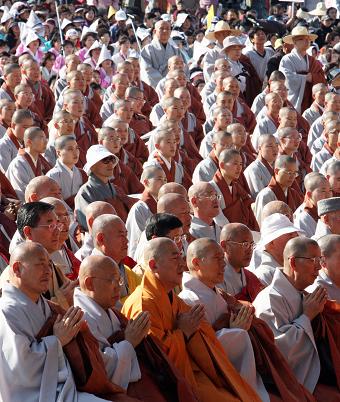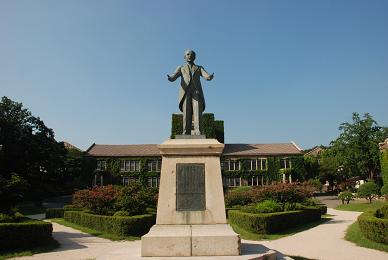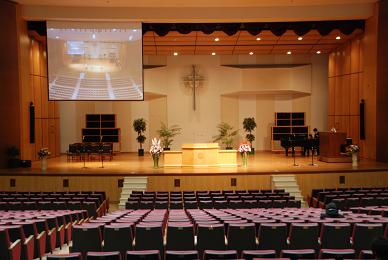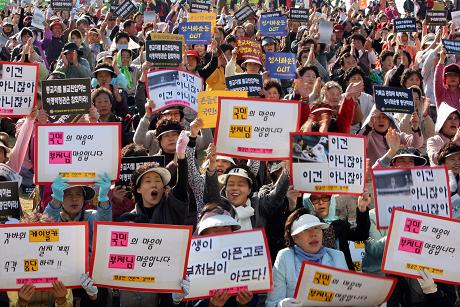Yonseians’ various perspectives regarding religion

THIS YEAR in Korea, controversies regarding religious bias have been a hot topic nationwide. Buddhists held a largescale street rally, protesting that President Lee Myung-bak's government is biased toward Protestants. Putting aside the question whether religious bias was truly a fault of the Lee administration, it seems certain that long-buried conflicts over religion in Korea and controversies over religious bias have resurfaced.
Controversies or conflicts over religion are not confined to a largescale or nationwide protest, however. They are easily found in everyday lives, whether individuals can perceive them or not. For example, university students without religion might feel discomfort when they are held up by evangelists in school on their busy way to classes. On the other hand, religious people might get hurt when others look at them in a biased manner. Regardless of whether the problem is obvious or more subtle, it exists in almost every place and level, and affects people's lives in one way or another.
Accordingly, The Yonsei Annals took the opportunity to look closely at the issue of religion, which has been regarded as a hot potato in our society. Through the survey, 1,257 Yonseians shared their views and ideas regarding religion and the issues around it.
What is religion?
Everyone knows what a religion is, butthat does not guarantee that they truly understand it. To understand how religion affects our lives and why people have their own religions, it is necessary to understand the origins of religion: how human beings came to believe in it. Kim Jae-young (Prof., Dept. of Religious Studies, Sogang Univ.) says formation of religion might be related to humans' fundamental fear of death and desire to be transcendental beings, as empirical studies on the history of religion suggest. "Every human is fundamentally spiritual, and desires to depend on something or someone on a higher level than oneself. Religion might have come into the world due to such people's weaknesses and desires," he says. According to his analysis, religion is not only for religious people, but also for non-religious people, because it originated from a universal desire that everyone shares in common. Kim explains, "Some people can't keep their lives normal without climbing mountains, because it constitutes quite a large part of their lives. Though it is hard to affirm, in some people's mind, mountains play a role that is similar to that of religion." When applying this perspective to both religious and nonreligious people, religion can be an understandable and common concept for everyone.
Various religions in Yonsei Univ.

The Annals asked Yonseians what religion they believe in. It turned out that 46.30% of respondents are not religious, followed by 29.51% Protestants and 10.50% Roman Catholics. Considering that Yonsei Univ. is a Protestant Christian missionary school, the percentage of Protestant students seems quite small. Compared to the ratio of Protestants nationwide, however, it is not a small amount. According to the survey done by Gallup Korea in 2004 on Koreans' religions and religious consciousness, the most popular religion was Buddhism (24.4%), followed by Protestantism (21.4%). It can be assumed that the identity of Yonsei Univ. as a Protestant Christian school might have affected students' religions. There were no respondents who believed in Confucianism, Islam, Jeung San Do, and Hinduism, however. In a broader view, the overall ratio of religious students turned out to have increased, compared to the result of the survey conducted by the Annals 22 years ago ("Various Religions in a Christian School," October, 1986).
Though 42.08% of respondents said they believe that God exists and 15.12% of respondents said they don't, a comparatively large number of Yonseians (42.80%) turned out to be hesitating in showing a definite stance amid an incessant controversy over the existence of God. When compared to the survey results of 1986, it is a great difference, because there were only a few students who did not give a clear answer then. Also, surprisingly, the number of people who say they believe in God's existence decreased by almost 40%. In the survey of October 1986, 82.0% said they believe that God exists and only 7.5% said they do not. This change seems not only to be confined to Yonsei Univ., but is also in the United States. "It is a little hard to predict what that will look like, but two things do seem clear. One is that there will be a much larger number of non-Christians and non-believers in the United States than there have been in the recent past," John Green (Senior Fellow, Religion and Public Life Research Center) said at the Washington-based Pew Forum.
As people have such different perspectives upon religions and God's existence, it might be obvious that there is a variety of controversies in the world regarding religion. As well as a nationwide issue like the controversy over the government's alleged religious bias, various conflicts are easily found on every level of our lives.
Evangelizing, is it desirable?
In everyday life, students are often faced with evangelists who try to convert them to a particular religion. It seems that there are students who don't welcome those evangelists that much, however. Choi Seo-yeon (Soph., Dept. of Info. and Industrial Engin.), who is Christian, says that even though she has a religion, she feels uncomfortable when faced with evangelists. "When evangelists address me on the streets, I usually don't reply, because I don't know whether they are credible or not. Also, I think I will not come to believe in the religion which they want me to know, even if I listen to their missions."
Yonseians' opinions seem to be similar to hers. When asked how they view evangelizing on streets, most respondents expressed negative stances. Only 7.96% of respondents were positive toward evangelizing, while 75.10% were negative. Shin Yoo-na (Leader, Intervarsity Christian Fellowship (IVF) (religious dongahree in Yonsei Univ.)), who is a Christian and has engaged in missionary work several times, says she considers such negative views of evangelists when doing missionary work. "I do missionary work, but I don't want to annoy anyone. That's why I and many evangelists just ask people at first whether they want to listen to us or not," she says. Also, she says that she sometimes gets hurt when people regard missionary work so negatively. "I do missionary work not for myself, but wholly for others. If I were to just do it for my own sake, talking to strangers on streets is never easy, and sometimes is tiring work. However, I just hope others can have opportunities to learn about God, and that's why I do such tough work. So I really get hurt when people don't consider my good intentions, and just give me a strange look," she adds. When asked how many people come to have an interest in God through mission work, Jeon Nari (Manager, Every Nation Mission (ENM)) says that around 10% of people show their interests in missionary work in general, and only one or two people per year come to have a relationship with evangelists ultimately.
Yonsei, a Protestant Christian school

Yonsei Univ. is a Protestant Christian school, so it pursues spreading the doctrines of Christianity. For that purpose, Yonsei Univ. imposes students' obligation to attend Chapel for four semesters, and also courses on Christian studies for one semester. There are controversies over whether our school's policies are desirable or not, however. It turned out that students have different opinions regarding the mandatory attendance at Chapel, and among the rest, the opinion that attending Chapel should be up to each individual's choice was the most prominent. A total of 50.76% of respondents said attending Chapel should be up to each individual's choice, and 23.71% said the obligation to attend Chapel is necessary. A comparatively small number of students (17.90%) said attending Chapel might not be necessary.
Public officials and religion

It turned out that a majority of respondents (63.64%) think public officials should refrain from presenting their religious preference, and 28.32% think there is no need for officials to hide their religious identity due to freedom of
religion.
About this issue, Kim suggests a new view point, pointing out the immature culture regarding religion in Korea as the basis of this controversy, without evaluation of the truth of the allegations of bias. "Koreans lack tolerance for different points of views in general. Recent conflicts over religious bias reflect this aspect of Koreans," he says. " When education about religion goes well and people come to adapt to diversity in a natural way, there will be no such conflicts," he adds.
Tolerance and understanding are needed
Most of the issues and conflicts originate from a clash between different perspectives, and it might be a universal law that understanding and tolerance are the only keys to solve such conflicts. Thus, it can be applied to conflicts
regarding religion, because most of them are caused by conflicts of different perspectives about religion. Kim emphasizes the importance of education on religion in this respect. "When religious education goes well in society, people can broaden their perspectives regarding religion. This will help people notice and understand others' beliefs, and result in decreasing religious troubles," Kim says.
* * *
Even if the survey result shows that people who believe in God have decreased by a large amount, religion still plays an important role, and its status and influence have been expanded as time has passed. A total of 69.37% of respondents replied that religion's influence and status is quite high, and it seems that this influence is getting bigger
and bigger. This might imply that everyone, both religious and nonreligious, is living his/her life under the influence of religion, though the degree of influence is different for each and every individual. Considering this large influence of religion, and its importance in people's lives, conflicts and even trivial troubles regarding religion should be considered seriously, and be solved as quickly as possible.
To do this, religious education might be the answer, as Kim emphasizes. Throughout the survey, it turned out that there exist various views and perspectives regarding religion, and regardless of whether one is religious or not, nearly all the students have their own spiritual beliefs and opinions. Also, everyone should try to open their minds toward differences. When education and people's efforts are combined, issues regarding religion will finally come to be solved.


softabmrgiou@opilon.com